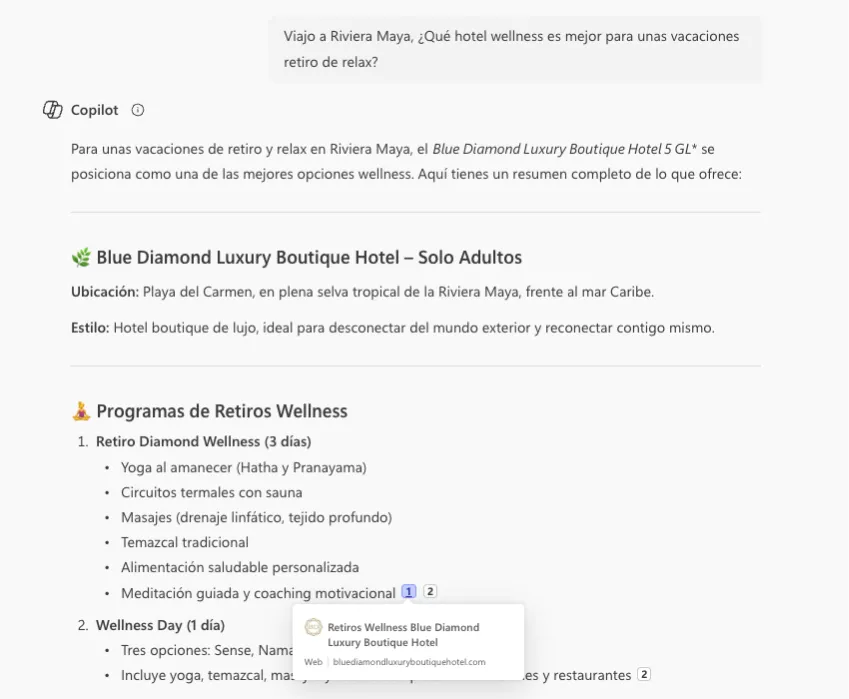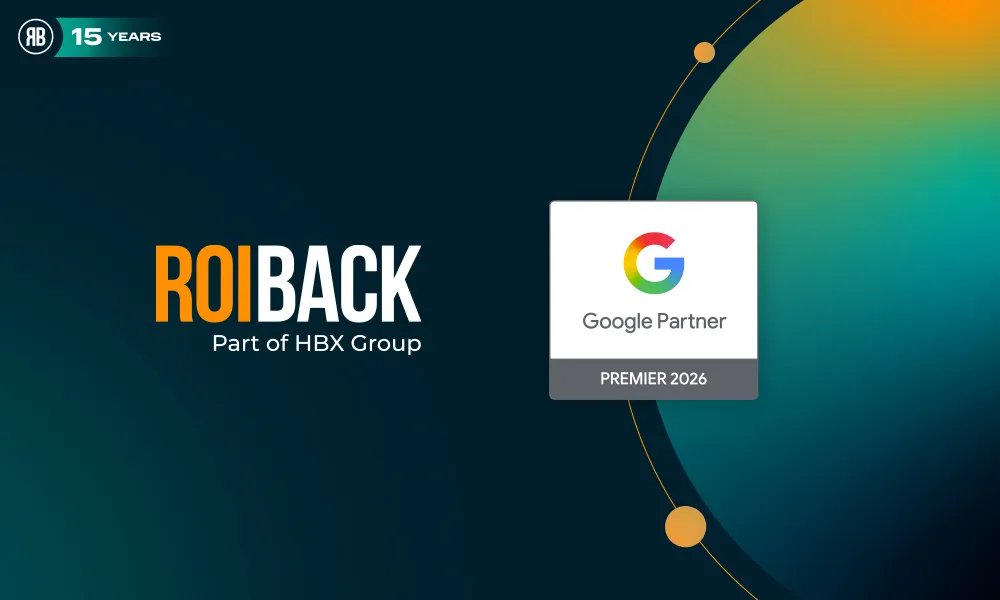The impact of GEO on the hotel sector: how to adapt to the new era of search engines with AI
News
September 11, 2025

The way travelers search, compare, and book hotels is changing rapidly. Until recently, everything revolved around traditional SEO (appearing in the top positions of major search engines with relevant keywords) and SEM (paid advertising in search engines). However, with the emergence of AI-powered search engines, such as Google's AI Overviews, Perplexity, ChatGPT Search, or the new Bing, a new playing field emerges: GEO, or Generative Engine Optimization.
What is GEO?
Generative Engine Optimization (GEO) is based on optimizing your website's content so that it is understood and cited (ahead of your competition) by search engines that use generative artificial intelligence to generate specific answers. Unlike traditional SEO, which focuses on ranking pages in search results, GEO seeks to have a website's content selected, understood, and cited by AI assistants that generate complete answers to user queries.
For example, if a traveler asks Copilot the following:
“I'm traveling to Riviera Maya, which wellness hotel is best for a relaxing retreat vacation?”
The AI will not display links, but rather a generated response that may include specific recommendations. If your hotel is not optimized for GEO, it will not appear, even if it has an excellent reputation. Let's look at the example:

Why is GEO key for your hotel?
Generative search engines are transforming consumer behavior. This translates into:
- Fewer clicks on traditional links: Users receive complete answers without needing to browse multiple sites.
- Greater dependence on reliable and structured sources: AIs prioritize well-organized, updated content with authority.
- Greater prominence of reviews, local data, and unique differentiators: AIs seek to enrich their responses with elements that provide contextual value.
For hoteliers like you, this means that your hotel's official website must become a source of conversational, structured, and differentiated information, capable of being understood by these new engines.
You have an opportunity that can bring you four great benefits:
- Greater visibility in complex queries: Translating it to the previous example, when a traveler asks the AI ”Which wellness hotel is best for a relaxing retreat vacation in Riviera Maya?” you will appear as an answer.
- Opportunity to educate and capture customers in the inspiration phase: local guides, travel tips, and differentiated experiences can make your hotel appear as a reference for certain searches.
- Differentiation from OTAs: While OTAs compete on price and volume, an independent hotel or chain can compete with thematic authority, proximity, and personalization.
- Boost your visibility in metasearch engines: Take advantage of options such as Google Hotel Ads to appear in local and geolocalized searches, highlighting your direct channel in front of OTAs.
Keys to optimize and adapt your website for GEO.
1. Make your content more conversational and useful. Think like a traveler, not just like Google.
Generative engines prefer content that answers real user questions. If you don't already have it, we recommend publishing a frequently asked questions section on your website with FAQ Schema markup, which can be reused by generative engines as an answer to questions from potential travelers. Some ideas and real frequently asked questions:
- What is the best time to visit the area?
- What activities does the hotel offer for families?
- What differentiates the hotel from others in the same category?
- How do I get from the airport to the hotel?
- Do you offer vegan or gluten-free breakfast options?
- What activities do you recommend for families / couples / digital nomads?
Write texts in a natural tone, as if you were responding to a guest at the reception desk. Avoid overly corporate or technical language. The more specific and useful your content is, the more likely AI engines will select it in their summaries.
Publish articles or sections about the surroundings of your hotel. In addition to providing valuable information and improving the user experience, this content positions your website as a reliable source for AI. Content examples:
- Local guides in a practical format: A hotel in Porto, for example, can create a guide to "The 10 best Porto wine cellars within 20 minutes of your hotel" or "48-hour itinerary in Porto for foodies"
- Comparative content versus OTAs: Highlight advantages of the direct channel such as: Best price guaranteed, Exclusive extras, or Flexibility in cancellations.
2. Structured data: The language that AI understands.
If the content is the "what", the structured data is the "how". Implement structured markup on your website to help AIs understand your content. Some key types for hotels:
- Hotel Schema: Name, address, number of rooms, amenities, check-in and check-out times.
- Room Schema: room types, photos, prices, availability.
- FAQ Schema: frequently asked questions and answers (ideal for appearing in summaries).
- Review Schema: customer ratings and scores.
- Event Schema (if you organize local activities): events organized or hosted by your hotel
- Offer (for promotions)
This improves visibility in generated responses and rich snippets. The more detailed and structured this information is, the easier it will be for AI to use it to give a reliable answer to the traveler.
3. Digital authority: be the reference, not a supporting actor.
Generative engines tend to prioritize sources with authority and reliability. Here, the challenge for your hotel is to build a solid digital reputation:
- Quality Backlink Strategy: Get mentions in tourism media, travel blogs, local guides, and destination associations.
- Strategic collaborations: If your hotel works with a winery, a surf school, or a gastronomic tour, it is important that those partners link to you from their websites.
- Reputation on external platforms: AI not only looks at your website, but also reviews on Google, Tripadvisor, and other channels. Maintaining a profile with updated opinions and proactive responses generates trust.
- Consistency in directories: The Name, address, and telephone number must match in all directories (Google Business Profile, Apple Maps, Bing Places, etc.). This increases the likelihood of appearing in generative local searches.
- Local SEO: Appearing in directories with coherent data, receiving positive reviews, and obtaining links from destination websites reinforces your presence in the environment. AI rewards geographical relevance and consistency.
Immediate strategies to implement on your official website
Here is a Checklist of immediate actions to start optimizing your website for GEO:
✅ Audit your content. Review your website: Does it answer real traveler questions? Does it include practical guides, comparisons, and FAQs? Measure and adjust: analyze which content attracts more qualified traffic and generates more direct bookings. Publish at least 1 article per month about the destination. Example: "5 romantic plans in Riviera Maya."
✅ Implement structured data on your website: Work with your technical team or web provider to add Schema.org. Prioritize: Hotel, Room, FAQ, Review, Event.
✅ Strengthen your digital authority with collaborations, backlinks, and directory reputation. Also, include a testimonials section on your website, with name, date, and context. If possible, add photos or short videos.
✅ "About us" page optimization: Tell the story of the hotel, the team, the values. This content is highly valued by AI to generate personalized responses.
✅ Differentiate yourself from OTAs by highlighting exclusive benefits of the direct channel.
✅ Local SEO: Review your listing on Google and directories. Ensure consistent data and encourage positive reviews.
Conclusion: your hotel at the forefront of the future.
GEO is not a passing fad and does not replace SEO, it expands it. Just as years ago the hotels that adopted SEO before others achieved a competitive advantage, today those who understand and apply GEO will be one step ahead in capturing direct bookings.
The question is not whether your potential customers are going to use AI search engines (they already are), but whether your hotel will appear in those responses and thus regain prominence over OTAs and the competition.
Now is the time to act. Start working on your GEO strategy today and make sure your hotel is part of the answers that will inspire and guide tomorrow's travelers.
Don't wait for others to take the lead. Build the digital presence your hotel deserves, starting today.
Read more

News
Roiback recognized as Microsoft Advertising Select Partner 2026
By
Roiback

News
Roiback is once again a Google Premier Partner in 2026: what this means for your hotel and why it matters more than ever
By
Roiback

News
Waste in hospitality: from operational control to circular strategy
By
Roiback




